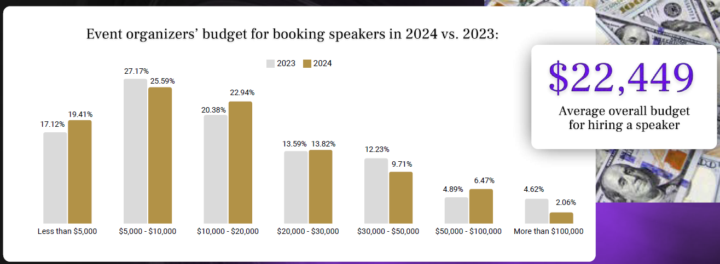
Write something
🚀 Drop Your Website Here! 🎤
Your speaker website isn’t just a nice-to-have—it’s your digital stage. (Ha) It’s where event planners decide if they want to book you. It’s where your leads go to learn more. And if you don’t have one yet? This week’s priority = Get one up! Even a simple, free site is better than nothing. You can add it to your email signature, social media, and even put it on a QR code for conferences. The goal? Convert visitors into booked gigs. Here’s what your site NEEDS: ✅ High-quality photos & videos (your demo reel front and center!) ✅ Your keynote topics & a short bio ✅ A way for event planners to contact you ✅ A media kit & downloadable speaker one-sheet ✅ Links to your social media ✅ A way to collect emails—yes, even if you’re not sending a newsletter yet! Now, let’s network. Drop your speaker website & social links in the thread. You never know who might have a gig or opportunity for you! 🎯

Great tool!
I have never done all of these steps, but I can see how powerful they are. I plan to use this for my upcoming speech at Generation Women in January. https://www.linkedin.com/posts/vinhgiang_this-process-is-called-record-review-activity-7271852336493268992-6dUY?utm_medium=ios_app&utm_source=social_share_video_v2&utm_campaign=copy_link
Understanding Event Organizers’ Budgets
Budgets in the speaking world can be all over the place. Some events, like community service ones, have no budget at all. Big conferences, though, can have huge budgets. If you’re only targeting small organizations, like chambers of commerce, don’t expect big payouts. They aren’t profit-driven, so they don’t have the money to spend on speakers. If you want bigger fees, you’ve got to target bigger organizations. Most organizations have budgets tucked away in different buckets. It could be for training, learning and development, or personal development. Your job is to find the right bucket when you’re talking with event planners. The 2024 Speaking Industry Benchmark Report says 46.47% of events have budgets between $10,000 and $50,000 for speakers. So, if someone says they have no budget, maybe you’re not speaking to the right person. A manager might love your talk, but they usually can’t unlock funds. You might need to ask them to connect you with a director or VP. Also, keep in mind that big organizations run on budget cycles. They set budgets at the start of the year. If you’re pitching in Q4, the money might already be gone. That’s why timing matters. Offering free value upfront—like a solid lunch-and-learn—can position you for success when the budget resets. And that free session can’t be surface-level stuff. If people feel like they could get the same thing from YouTube, they won’t hire you. Make sure your free content is better than what others charge for. At the end of the day, it’s about positioning yourself as a leader. Most events have money—it’s just about figuring out how to unlock it.

1-3 of 3

skool.com/the-frequent-speaker
Struggling to get booked? Speaking is a business! Learn the sales and marketing game! Create content, attract event planners, and secure more gigs.
Powered by

